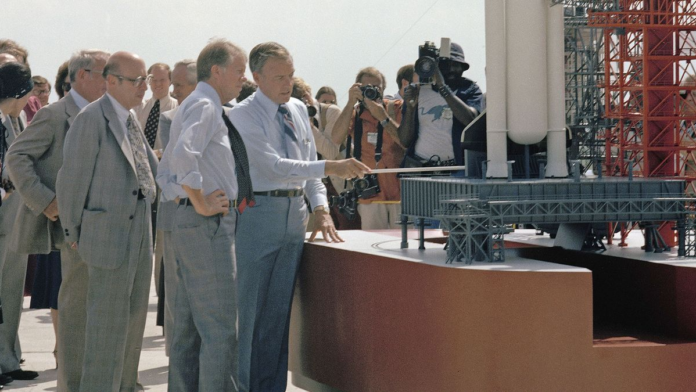At the Kennedy Space Center in Florida on Oct. 1, 1978, President Jimmy Carter, hand on waist, is briefed on preparations for the first space shuttle launch by center director Lee Scherer. To the left of Carter is NASA Administrator Robert Frosch.
The longest-lived president in United States’ history, Jimmy Carter’s voice will continue to extend “into the cosmos” beyond his death at 100.
Carter, who died on Sunday (Dec. 29) at his home in Plains, Georgia, recorded the country’s official message that was launched in 1977 and now travels beyond our solar system on the Voyager Golden Record. He addressed his remarks to whatever civilization or species might come across the twin probes in the future: “We are attempting to survive our time so we may live into yours.”
“We are saddened by the passing of President Jimmy Carter, who contributed to the Voyager Golden Record currently traveling through interstellar space,” NASA officials posted to the agency’s social media accounts. “Carter’s message of peace continues to reach across the ‘vast and awesome universe.’”
Carter served as the 39th President of the United States from 1977 to 1981. In addition to being in office when the Voyager probes left Earth, he was president when NASA recruited its first women, Black and Asian astronauts in 1978, and when Skylab, the country’s first space station, fell back to Earth in 1979.
Related article: Presidential Visions for Space Exploration: From Ike to Biden
Carter’s greatest legacy to the space program, though, may be the support he gave to funding the continued development of the space shuttle. Without the additional money that NASA received in 1979 and 1980 — years in which Carter otherwise sought broad spending cuts — the iconic winged orbiter that flew for more years than any other U.S. spacecraft in history may have never left the ground.
Although Carter was known to favor NASA’s robotic missions over launching astronauts, he saw value in moving forward with the space transportation system.
Get the Space.com Newsletter Breaking space news, the latest updates on rocket launches, skywatching events and more! Contact me with news and offers from other Future brands Receive email from us on behalf of our trusted partners or sponsors
“I was not enthusiastic about sending humans on missions to Mars or outer space,” Carter said in a 2016 interview with the website Ars Technica. “But I thought the shuttle was a good way to continue the good work of NASA. I didn’t want to waste the money already invested.”
On Oct. 1, 1978, Carter received an update on the space shuttle’s progress while on a visit to Kennedy Space Center for the 20th anniversary of NASA’s founding. During that same trip, Carter helped honor some of the nation’s most accomplished astronauts with the presentation of the first Congressional Space Medal of Honor awards.
The medal’s first recipients included Apollo 11 commander Neil Armstrong, Gemini pilots Frank Borman and Charles



